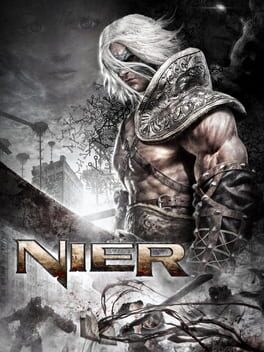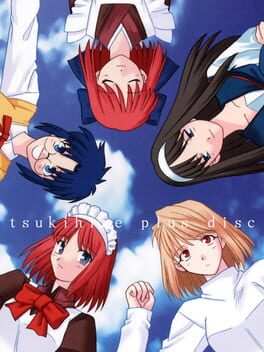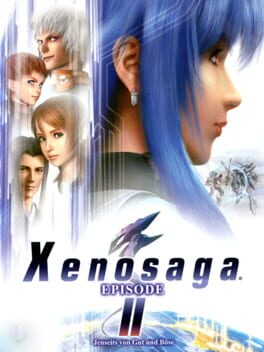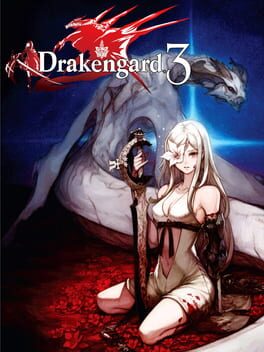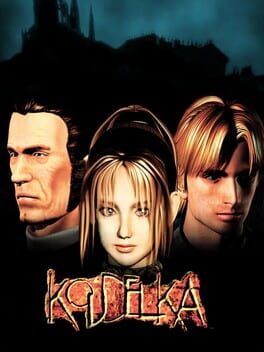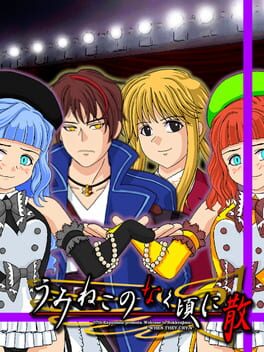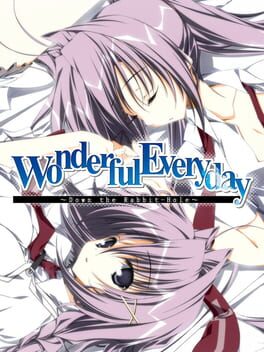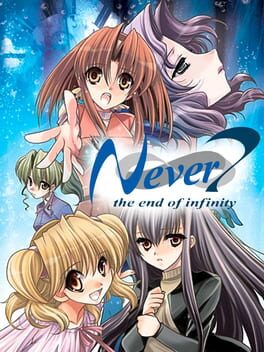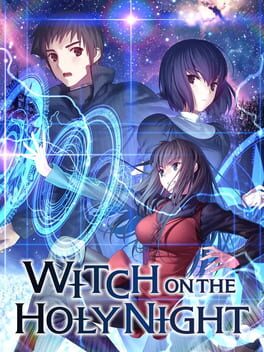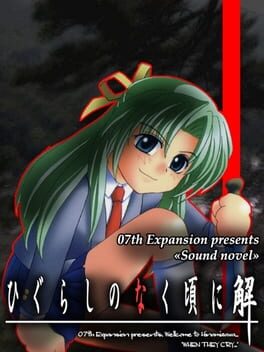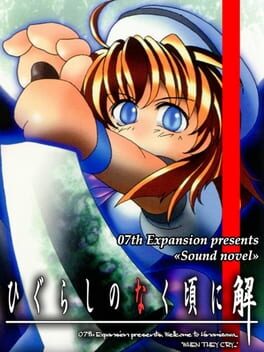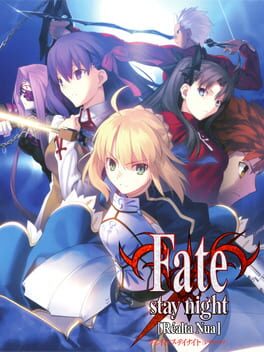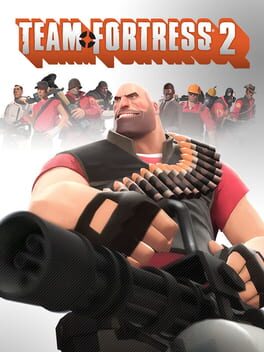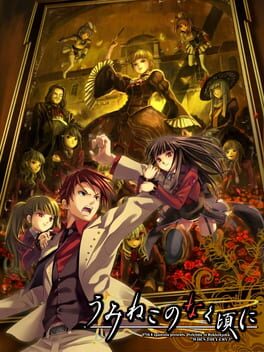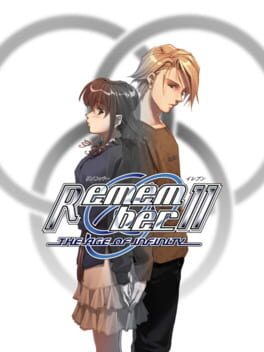hexerii
143 reviews liked by hexerii
NieR
2010
This review contains spoilers
IM DELETING YOU, FATHER! ██]]]]]]]]]]]]]]]]]]]]]]]]]]]]]]]]]] 10% complete..... ████████]]]]]]]]]]]]]]]]]]]]] 35% complete.... ████████████]]]]]]]]]]]] 60% complete.... █████████████████] 99% complete..... 🚫ERROR!🚫 💯True💯 Replicants of The Village are irreplaceable ☪I could never delete you FATHER!💖 Send this to ten other 👪Gestalts👪 who would give their lives for ﷲShadowlordﷲ Or never get called ☁️Father☁️ again If you get 0 Back: Junk Heap grinding for you 🚫†🗑🚫 3 back: you're off the sidequests list☁️💦 5 back: you have pleased Popola greatly☪💦 10+ back: FACADE!ﷲ!💕👅
██████████████████ 100% complete...
I've lost 100% side quest completion save file i'm killing myself
██████████████████ 100% complete...
I've lost 100% side quest completion save file i'm killing myself
Tsukihime Plus-Disc
2001
Xenogears
1998
If reviews for video games were a simple game of math, adding and subtracting with strengths and flaws to find a raw number that serves as some semblance of an assessment of quality, then I don't think I could give Xenogears too high of a score. But I don't think that's helpful. The art we experience isn't meant to adhere to a rigid set of criteria. It's fun to be sure, but is it productive? Is it accurate? Because truth be told, I don't think it is. A review primarily serves to tell other people what you think of a video game, and if it's worth playing. And Xenogears is worth playing.
This probably sounds like the game is horrendously flawed, but it definitely is not. That being said, there are MANY issues with this game. The combat is fairly shallow, especially in Gears, the random encounters really disrupt the flow of gameplay, some dungeons are confusing and boring, there's a few minor translation errors, and of course there's disc 2 which was so rushed to get the game out on time that there's barely any gameplay and huge story beats are squeezed into brief narration segments.
These flaws are real, and I don't want to dismiss them. But did I enjoy Xenogears? Yes, wholeheartedly. It's so clearly a passion project and something everyone who worked on it cared deeply about. The story is so intricately detailed and well-told with probably the best worldbuilding I've ever seen in a video game. The characters are likeable and fleshed out. The music is by Yasunori Mitsuda so you know it's amazing. The spritework is amazing. Despite my gripes with it, the combat is really flashy, satisfying, and pretty fun. And, for what it's worth, most of the flaws with this game were things that couldn't be controlled - time and budget constraints placed on a pretty small team without a whole lot of experience who just wanted to create something incredible. And I they still did, despite all the compromises.
I think this is why we should judge games as a sum of their parts. Individually, a lot of things in Xenogears are rough and difficult to get over. You should go into this game with the expectation of being frustrated at times. I honestly recommend having speed-up during some sections. But... I still think you should go into this game. It's a magical experience that is absolutely worth trying. Just keep pushing through the rough patches and you will experience a phenomenal work of art. I'm going to go read Perfect Works now.
This probably sounds like the game is horrendously flawed, but it definitely is not. That being said, there are MANY issues with this game. The combat is fairly shallow, especially in Gears, the random encounters really disrupt the flow of gameplay, some dungeons are confusing and boring, there's a few minor translation errors, and of course there's disc 2 which was so rushed to get the game out on time that there's barely any gameplay and huge story beats are squeezed into brief narration segments.
These flaws are real, and I don't want to dismiss them. But did I enjoy Xenogears? Yes, wholeheartedly. It's so clearly a passion project and something everyone who worked on it cared deeply about. The story is so intricately detailed and well-told with probably the best worldbuilding I've ever seen in a video game. The characters are likeable and fleshed out. The music is by Yasunori Mitsuda so you know it's amazing. The spritework is amazing. Despite my gripes with it, the combat is really flashy, satisfying, and pretty fun. And, for what it's worth, most of the flaws with this game were things that couldn't be controlled - time and budget constraints placed on a pretty small team without a whole lot of experience who just wanted to create something incredible. And I they still did, despite all the compromises.
I think this is why we should judge games as a sum of their parts. Individually, a lot of things in Xenogears are rough and difficult to get over. You should go into this game with the expectation of being frustrated at times. I honestly recommend having speed-up during some sections. But... I still think you should go into this game. It's a magical experience that is absolutely worth trying. Just keep pushing through the rough patches and you will experience a phenomenal work of art. I'm going to go read Perfect Works now.
Learning to Love Umineko When They Cry
After 5 months and 137 hours, I now have fully experienced the story of Umineko: When They Cry. It’s a rollercoaster of feeling I can’t stop thinking on, but coyness from others suggesting why it’s so special turned me off and made me unnecessarily hostile. I want to reverse that view and try to explain what makes Umineko so special without giving away any major elements beyond what can be easily assumed.
At first, I wasn’t sure how much I’d get into it. I liked the plot of Higurashi, but outside of two characters aren’t super passionate for it nowadays. The 150+ hour length seemed like an insane commitment. And I worried about how the wackier anime quirks would clash with long dramatic storytelling. But I do enjoy stories about grand, gradually unfolding world defining mysteries, so with that and the enthusiasm of many friends in mind, I set to reading Umineko throughout the first half of 2024. And am I glad I did because the further in I got the more I couldn’t stop thinking about it.
Umineko presents as a mystery, building and challenging in exciting, intricate ways that'll keep the mind busy with every new Episode finished, but beyond that Umineko is about GETTING people. Comprehending worldviews. Figuring out a line of thinking that inspires every member of its cast to believe what they want to believe. It is a story that asks to engage with storytelling and comprehension. What inspires us, what makes us believe in fiction, what do we see in those who create, what do creators seek to give back to the world, what hurt goes into creation? What weight IS our life experiences?
But themes can mean little without engaging characters to explore and embody these dynamics and Umineko puts remarkable work to answer the call. Not just from the number of characters introduced, but how numerous scattered ideas combine into a defined storytelling whole.
Umineko has one of my favorite ensemble casts I’ve experienced in anything. The more you read, the more it feels like you piece together an extensive headspace for every major character, and Umineko presents these characters’ distinct viewpoints on any circumstance as a means to actively move the plot forward and meaningfully debate the best course of action in increasingly more dire and paranoid situations. Anyone who knows me knows I’m not a big fan of overly reactive casts, where perspective feels irrelevant to plot events. Umineko is the opposite of this. It’s a cast where it feels like ANYONE can alter the narrative trajectory, exciting me in how strong personalities can twist. So many in the cast, particularly of the Ushiromiya Family, have intriguing shades of gray to their personalities, rich inner lives you can map out much of in your head, incredible voice actors or certain specific life philosophies it’s interesting to see pushed by how the plot clashes these characters together.
In this regard, Umineko is able to have its cake and eat it too with including cackling anime girls. New major introductions on top of the huge starting cast come packed with new intriguing life paths to contrast against our built-up view of the story, the protagonist's view of the story and how we've grown to see the search for the truth, in addition to fun new designs.
On the design front, while some certainly raise eyebrowsglaring at Gaap whose design is exceptionally distracting in should be serious scenes, others work to purpose in addition to being fashionable. Looking at the four mother characters (Kyrie, Natsuhi, Eva and Rosa), the design of each adheres to a distinct design sensibility that communicates much in who they are and how they want the world to see them. The addition of adult characters with extensive histories allows for greater opportunity than was possible in Higurashi to have designs able to express more personality from each individual character.
Umineko exists as an eight-episode odyssey, so not knowing who in its titanic cast would get spotlight in any particular episode had me continuously excited to read more. Over 100 hours in I was still given enough to be curious for roles of many supporting cast members to pay off and to a certain extent nearly all of them genuinely do at some point or another. There’s a goal for the series and goals for each Episode; most major characters either undergo substantial arcs or interesting tests of character pushing their strong personalities, emphasizing their ability to impact the narrative and the layers of personality they struggle with. It truly feels like The Unknown Journey once one episode ends and you decide to see what could possibly be in store for the next one. I never had any way of knowing for sure and that was tantalizing; perhaps even moreso if going in fully blind.
With that in mind, a spoiler-free dive into what makes Umineko's most important players so special!
The belle of the ball is of course, Beatrice the Golden Witch; given immeasurable sad love by fans, yet over the top maniacal and macabre, boasting wacky expressions that appeared impossible to take seriously. Before reading, I found that contrast of fans' feelings toward her with that attitude and those goofy expressions too heavy. It didn't seem like those two sides of her would be able to mesh properly.
And then I heard her start talking.
THIS was the moment I knew she, and Umineko as a whole, would stick me to at least some extent. Her voice actress, Sayaka Ohara, doesn’t just read the lines like any other character: she EXPRESSES them playing a gleefully assertive witch to where you can almost hear her smiling. The breathiness to her tone, boisterous sense of pride, panickedness if she slips up, and going all out for name calling and laughs are quirks conveyed beyond the words on page. Once it seemed as if she was quickly inhaling through her nose as if taken aback during a line. She manages that incredible combination of being intoxicating whenever she talks to keep wanting to hear her say more things, and getting on your nerves just enough to want to see her get knocked down several pegs in the future: a delicate combination for a villain in a story to embody.
Backing this is a gorgeously drawn character design. The dress gives her a level of dignity while embodying a bird, a flower and a Disney Princess (particularly Cinderella with the style of dress, hair and choker and Belle with the running Flower motif to her). And having such a bold, bountiful design perfectly fits Beatrice's character. She WANTS to be the first thing that pops in your head when thinking about Umineko, and as you keep reading it you get to see that thought expressed and stretched in numerous heart-turning ways.
As Umineko goes on, Ohara’s voice performance becomes more nuanced as you start seeing more “forms” of this character, including one that made me teary, but you still keep wondering “how did she end like this at the start” and Umineko mostly understands the value of that answer. For what reason she takes on her role to drive the conflict, and the answer the protagonist seeks to prove as the heart of her being kept me engaged, and Ohara truly gave it her all to give her so much expression and personality and become one of my favorite VO performances EVER.
Said protagonist, Battler Ushiromiya, also grew on me a lot. He starts out in a VERY questionable place with awful tone-deaf jokes, but Umineko recognizes just how far he should grow as a person and the story moves accordingly to how well he understands the rules of the overarching game. Daisuke Ono’s performance melds cocky youthful energy and gentle compassion seamlessly. Battler is a snarky, headstrong ego with a lot of grins and swagger and showmanship but with truly genuine care for his family, a strong sense of justice and an increasingly growing ability to understand the gravity of situations, nailing the game face when the chips are down. Jokes notwithstanding that mix of attitude and compassion makes it exciting to see what kind of crazy rabbit hat trick he'll try to decipher and also sad to see when he's back into a corner from horrific circumstances around him. Ono's able to sound genuinely depressed when the time calls for it.
As the story’s lead, Umineko has a lot of fun playing with his comprehension of the story in relation with our own; it examines the dichotomy of a pov character through multiple convergences and divergences from the audience in his journey to learn the truth of Umineko's mysteries. He has bite to him, not just mocking his opponents; but when pushed, looking down on them, belittling them and not standing for anyone’s nonsense. As he and Beatrice are very sassy and headstrong, their numerous debates lead into many fun, characterful and occasionally depressing back and forths. It's one of the main elements people who haven't played Umineko are probably aware of it. You could watch the two do something exceptionally mundane and their incredible chemistry and voice actors would make it feel both important and entertaining.
What is exactly is Ushiromiya Battler’s purpose FOR this narrative becomes increasingly dissected the further in you get. By the final episode, his role and comprehension of expression feels wholly different from the start, and we appreciably get to SEE all of it play out onscreen. No dumb timeskip bullshit.
The last character I want to specifically point at is Ange.
Rocking a design blending cool and cute, she is a young girl who struggles to get close to anyone, because of her powers, status, and cripplingly low self-esteem that makes her feel everything is her responsibility. Given the circumstances Ange starts in, it’s understandable she’d be closed off and emotionally guarded but it nonetheless makes it satisfying when you persevere with her and believe she can build morale to smile again. And that doesn’t stop her spitting some killer snark! Ange is Umineko’s fulcrum. To believe in Umineko is to believe in Ange. Ryukishi has many inspiring, heartfelt messages to convey with her malleable psyche in a deeply personal plot, leading to a uniquely compelling coming-of-age drama. Ange’s heart is her guiding key: will you help her find it?
I won’t go any further into specific characters, but I will say: how Umineko depicts parenthood across its wide cast substantially provided for what makes Umineko resonant for me. That was an element I had zero expectations for its handling going on, but I was shocked how thorough issues regarding being a parent and the tumultuous, messy outcomes of marriage in Japanese society at this time are so thoroughly depicted. It can be conflicting and gut-wrenching at times, but it never fails to believe empathy can exist.
Umineko tries its hardest to avoid selling the familial conflicts as strictly black and white. There’s layers of complicated feelings at play regarding how and why faults are created that I believe can very easily inspired continued conversations and let Umi resonant well after concluding. This story shows the worst of ourselves but also, the best of ourselves, and the belief there is always a reason to keep going. Always a thought to our actions. A reason to consider walking in someone else’s shoes for what drives them to extremes. It broadens our perspective on US. The "flip the chessboard" mentality coined by Kyrie doesn't just pertain to logic games. It speaks to our understanding of everyone around us and in the context of Umineko, the unique methods and lengths every character has for achieving their own goals.
But beyond character and themes, another way a story can stick with me (and a huge part as to why I've chattered about Sonic so much, lol) is a distinct, memorable soundtrack. And Umineko also has TUNES! It originally existed as a “sound novel” where music had to do much of the work in light of crude but soulful sprites and simple backgrounds, so Ryukishi brought a suite of composers for just that and later Umineko ports brought even more. The composer list feels as vast as a pre-Smash Bros 4 Smash game, many bringing their own style and zts being told to lock the F in every song. Many of the best songs play during some of the most powerful moments in the plot so I’ll share just one to embody Umi’s musical tone:
https://youtu.be/mcG0nYC89tQ?si=Y0UZOIn6zQ2hpcBL
Umineko has an onslaught of great songs that really make a splash when you first hear them. Goldenslaughterer, far, Toten Blume, the executioner, Monochrome Clock, Birth of a New Witch, Golden Nocturne and many more give scenes distinct, lasting expression beyond the limitations of VN sprites. And even beyond those, the credits themes for every chapter manage to close off each's mood in a particularly special way.
Also on the audio front is voice acting. A star-studded cast of exceptionally talented voice actors were added into later versions of the VN as enough reason for the maligned anime to justify existing. Even as someone who isn't usually enamored with voice acting for languages I don't understand, the performances are exceptional and a huge reason I kept at it. At worst, a performance perfectly embodies a character's archetype and at best it's some of the strongest acting I've heard in anything ever. As I've gone through extensively, Sayaka Ohara’s Beato was the sell for Umineko as a whole for me in how incredibly versatile her performance as Beatrice was, but these Daisuke Ono as Battler, Miki Ito as Eva, Mugihito as Kinzo and Yukari Tamura as Bern I believe were also some of the most consistently great performers to where I always let their lines play out. Yukari Tamura has a TON of great work in Umi's back half as you see the investment of that character evolve.
With everything I adore about Umineko though, I’m not going to pretend there aren’t notable flaws that could easily turn people off from the story/invoke side-eyes. So here’s a brief section discussing some of those:
For one: THE LENGTH. This 130+ hour story is several hundred thousand words longer than the Bible and at times you FEEL it. Episodes 1, 2 and 6 I believe have very slow starts on the first read before action takes off. In hindsight the choices made in these parts do pay off properly by either the end of the Episode or with twists in a future one but in the moment, they can feel like they drag their heels without the entertainment of debates. The only way to reach the end of this story having absorbed it all is to commit your LIFE to Umineko WtC, for at least a little while.
And even beyond length, sometimes it can feel too overindulgent for its own good. The end of Episode 2 comes to mind where I feel like shock value went a bit too far even for a story like this. While its jokes aren’t AS bad as Higurashi’s (hell there's even some good pure dialogue jokes at sporadic points in the run) many more devoted jokes fall flat in the early Episode sections, particularly from Battler in ways that could’ve been written smarter. Thankfully, these kind largely dissipate as the story continues.
Conversations between major characters can be exceptionally dense and revealing of intriguing interpersonal relationship drama throughout, but there are some side characters introduced that exist as tools, bereft of depth and relying on “anime quirky” personality traits easy to find grating. To its credit, Umineko IS better than most stories at suggesting which characters are clearly unimportant to the story’s grand scheme and it has more than enough to get around this, but it does make it less engaging whenever they appear.
Lastly, the middle third of the final episode, Episode 8 can feel very rushed, which may sound crazy from a story so long, but there are certain dialogue sections regarding its lingering mysteries that can and HAVE rubbed people very badly because of what it suggests of its readers. Personally, speaking I can understand what this section was trying to communicate but anyone who felt ripped by this point, I get it.
This is the one Episode where the adaptation manga is an essential, adding substantiality to many points including HUGE turning point question. Ignoring the awful first cover which gave me a horrendous impression of Umi before reading, the manga is sublime. Kei Natsumi understood exactly what dramatic beats to elevate. Action scenes that could feel gratuitous when merely written out have defined framing that's superbly drawn. Natsumi has impressive talent for detail, shading and spreads for how many characters exist at that point. And the chosen compositions had me crying my eyes out multiple times more than Episode 8 did in the visual novel.
Needing supplemental material in a different medium to fill holes is usually not a great thing, which is why I note it in the Flaws section, but when it’s THIS excellently made, it’s hard to be mad. The payoffs from the Ep8 manga are exceptional and it’s easy to find the manga for free if you know where to look.
Ultimately what I listed I consider to be slight blemishes to a distinct, immaculate tapestry.
From Ryukishi07's pen, the world was given many heartfelt sincere messages, absolutely wild plot twists, incredible voice performances, really fun and distinctly spread character dynamics, a soundtrack full of insane EDM trance headbangers alongside somber tracks that still stand out, characters that thanks to the story structure are allowed to feel incredibly multifaceted and/or morally gray with interesting inner lives and/or life philosophies to track while reading, mysteries with layered tricks that stick around in your head long after being raised and new avenues for conversation regarding stories and storytelling by using the Visual Novel point-of-view. In short, the Umineko brainrot is real.
I WILL NEVER FORGET THIS STORY
After 5 months and 137 hours, I now have fully experienced the story of Umineko: When They Cry. It’s a rollercoaster of feeling I can’t stop thinking on, but coyness from others suggesting why it’s so special turned me off and made me unnecessarily hostile. I want to reverse that view and try to explain what makes Umineko so special without giving away any major elements beyond what can be easily assumed.
At first, I wasn’t sure how much I’d get into it. I liked the plot of Higurashi, but outside of two characters aren’t super passionate for it nowadays. The 150+ hour length seemed like an insane commitment. And I worried about how the wackier anime quirks would clash with long dramatic storytelling. But I do enjoy stories about grand, gradually unfolding world defining mysteries, so with that and the enthusiasm of many friends in mind, I set to reading Umineko throughout the first half of 2024. And am I glad I did because the further in I got the more I couldn’t stop thinking about it.
Umineko presents as a mystery, building and challenging in exciting, intricate ways that'll keep the mind busy with every new Episode finished, but beyond that Umineko is about GETTING people. Comprehending worldviews. Figuring out a line of thinking that inspires every member of its cast to believe what they want to believe. It is a story that asks to engage with storytelling and comprehension. What inspires us, what makes us believe in fiction, what do we see in those who create, what do creators seek to give back to the world, what hurt goes into creation? What weight IS our life experiences?
But themes can mean little without engaging characters to explore and embody these dynamics and Umineko puts remarkable work to answer the call. Not just from the number of characters introduced, but how numerous scattered ideas combine into a defined storytelling whole.
Umineko has one of my favorite ensemble casts I’ve experienced in anything. The more you read, the more it feels like you piece together an extensive headspace for every major character, and Umineko presents these characters’ distinct viewpoints on any circumstance as a means to actively move the plot forward and meaningfully debate the best course of action in increasingly more dire and paranoid situations. Anyone who knows me knows I’m not a big fan of overly reactive casts, where perspective feels irrelevant to plot events. Umineko is the opposite of this. It’s a cast where it feels like ANYONE can alter the narrative trajectory, exciting me in how strong personalities can twist. So many in the cast, particularly of the Ushiromiya Family, have intriguing shades of gray to their personalities, rich inner lives you can map out much of in your head, incredible voice actors or certain specific life philosophies it’s interesting to see pushed by how the plot clashes these characters together.
In this regard, Umineko is able to have its cake and eat it too with including cackling anime girls. New major introductions on top of the huge starting cast come packed with new intriguing life paths to contrast against our built-up view of the story, the protagonist's view of the story and how we've grown to see the search for the truth, in addition to fun new designs.
On the design front, while some certainly raise eyebrows
Umineko exists as an eight-episode odyssey, so not knowing who in its titanic cast would get spotlight in any particular episode had me continuously excited to read more. Over 100 hours in I was still given enough to be curious for roles of many supporting cast members to pay off and to a certain extent nearly all of them genuinely do at some point or another. There’s a goal for the series and goals for each Episode; most major characters either undergo substantial arcs or interesting tests of character pushing their strong personalities, emphasizing their ability to impact the narrative and the layers of personality they struggle with. It truly feels like The Unknown Journey once one episode ends and you decide to see what could possibly be in store for the next one. I never had any way of knowing for sure and that was tantalizing; perhaps even moreso if going in fully blind.
With that in mind, a spoiler-free dive into what makes Umineko's most important players so special!
The belle of the ball is of course, Beatrice the Golden Witch; given immeasurable sad love by fans, yet over the top maniacal and macabre, boasting wacky expressions that appeared impossible to take seriously. Before reading, I found that contrast of fans' feelings toward her with that attitude and those goofy expressions too heavy. It didn't seem like those two sides of her would be able to mesh properly.
And then I heard her start talking.
THIS was the moment I knew she, and Umineko as a whole, would stick me to at least some extent. Her voice actress, Sayaka Ohara, doesn’t just read the lines like any other character: she EXPRESSES them playing a gleefully assertive witch to where you can almost hear her smiling. The breathiness to her tone, boisterous sense of pride, panickedness if she slips up, and going all out for name calling and laughs are quirks conveyed beyond the words on page. Once it seemed as if she was quickly inhaling through her nose as if taken aback during a line. She manages that incredible combination of being intoxicating whenever she talks to keep wanting to hear her say more things, and getting on your nerves just enough to want to see her get knocked down several pegs in the future: a delicate combination for a villain in a story to embody.
Backing this is a gorgeously drawn character design. The dress gives her a level of dignity while embodying a bird, a flower and a Disney Princess (particularly Cinderella with the style of dress, hair and choker and Belle with the running Flower motif to her). And having such a bold, bountiful design perfectly fits Beatrice's character. She WANTS to be the first thing that pops in your head when thinking about Umineko, and as you keep reading it you get to see that thought expressed and stretched in numerous heart-turning ways.
As Umineko goes on, Ohara’s voice performance becomes more nuanced as you start seeing more “forms” of this character, including one that made me teary, but you still keep wondering “how did she end like this at the start” and Umineko mostly understands the value of that answer. For what reason she takes on her role to drive the conflict, and the answer the protagonist seeks to prove as the heart of her being kept me engaged, and Ohara truly gave it her all to give her so much expression and personality and become one of my favorite VO performances EVER.
Said protagonist, Battler Ushiromiya, also grew on me a lot. He starts out in a VERY questionable place with awful tone-deaf jokes, but Umineko recognizes just how far he should grow as a person and the story moves accordingly to how well he understands the rules of the overarching game. Daisuke Ono’s performance melds cocky youthful energy and gentle compassion seamlessly. Battler is a snarky, headstrong ego with a lot of grins and swagger and showmanship but with truly genuine care for his family, a strong sense of justice and an increasingly growing ability to understand the gravity of situations, nailing the game face when the chips are down. Jokes notwithstanding that mix of attitude and compassion makes it exciting to see what kind of crazy rabbit hat trick he'll try to decipher and also sad to see when he's back into a corner from horrific circumstances around him. Ono's able to sound genuinely depressed when the time calls for it.
As the story’s lead, Umineko has a lot of fun playing with his comprehension of the story in relation with our own; it examines the dichotomy of a pov character through multiple convergences and divergences from the audience in his journey to learn the truth of Umineko's mysteries. He has bite to him, not just mocking his opponents; but when pushed, looking down on them, belittling them and not standing for anyone’s nonsense. As he and Beatrice are very sassy and headstrong, their numerous debates lead into many fun, characterful and occasionally depressing back and forths. It's one of the main elements people who haven't played Umineko are probably aware of it. You could watch the two do something exceptionally mundane and their incredible chemistry and voice actors would make it feel both important and entertaining.
What is exactly is Ushiromiya Battler’s purpose FOR this narrative becomes increasingly dissected the further in you get. By the final episode, his role and comprehension of expression feels wholly different from the start, and we appreciably get to SEE all of it play out onscreen. No dumb timeskip bullshit.
The last character I want to specifically point at is Ange.
Rocking a design blending cool and cute, she is a young girl who struggles to get close to anyone, because of her powers, status, and cripplingly low self-esteem that makes her feel everything is her responsibility. Given the circumstances Ange starts in, it’s understandable she’d be closed off and emotionally guarded but it nonetheless makes it satisfying when you persevere with her and believe she can build morale to smile again. And that doesn’t stop her spitting some killer snark! Ange is Umineko’s fulcrum. To believe in Umineko is to believe in Ange. Ryukishi has many inspiring, heartfelt messages to convey with her malleable psyche in a deeply personal plot, leading to a uniquely compelling coming-of-age drama. Ange’s heart is her guiding key: will you help her find it?
I won’t go any further into specific characters, but I will say: how Umineko depicts parenthood across its wide cast substantially provided for what makes Umineko resonant for me. That was an element I had zero expectations for its handling going on, but I was shocked how thorough issues regarding being a parent and the tumultuous, messy outcomes of marriage in Japanese society at this time are so thoroughly depicted. It can be conflicting and gut-wrenching at times, but it never fails to believe empathy can exist.
Umineko tries its hardest to avoid selling the familial conflicts as strictly black and white. There’s layers of complicated feelings at play regarding how and why faults are created that I believe can very easily inspired continued conversations and let Umi resonant well after concluding. This story shows the worst of ourselves but also, the best of ourselves, and the belief there is always a reason to keep going. Always a thought to our actions. A reason to consider walking in someone else’s shoes for what drives them to extremes. It broadens our perspective on US. The "flip the chessboard" mentality coined by Kyrie doesn't just pertain to logic games. It speaks to our understanding of everyone around us and in the context of Umineko, the unique methods and lengths every character has for achieving their own goals.
But beyond character and themes, another way a story can stick with me (and a huge part as to why I've chattered about Sonic so much, lol) is a distinct, memorable soundtrack. And Umineko also has TUNES! It originally existed as a “sound novel” where music had to do much of the work in light of crude but soulful sprites and simple backgrounds, so Ryukishi brought a suite of composers for just that and later Umineko ports brought even more. The composer list feels as vast as a pre-Smash Bros 4 Smash game, many bringing their own style and zts being told to lock the F in every song. Many of the best songs play during some of the most powerful moments in the plot so I’ll share just one to embody Umi’s musical tone:
https://youtu.be/mcG0nYC89tQ?si=Y0UZOIn6zQ2hpcBL
Umineko has an onslaught of great songs that really make a splash when you first hear them. Goldenslaughterer, far, Toten Blume, the executioner, Monochrome Clock, Birth of a New Witch, Golden Nocturne and many more give scenes distinct, lasting expression beyond the limitations of VN sprites. And even beyond those, the credits themes for every chapter manage to close off each's mood in a particularly special way.
Also on the audio front is voice acting. A star-studded cast of exceptionally talented voice actors were added into later versions of the VN as enough reason for the maligned anime to justify existing. Even as someone who isn't usually enamored with voice acting for languages I don't understand, the performances are exceptional and a huge reason I kept at it. At worst, a performance perfectly embodies a character's archetype and at best it's some of the strongest acting I've heard in anything ever. As I've gone through extensively, Sayaka Ohara’s Beato was the sell for Umineko as a whole for me in how incredibly versatile her performance as Beatrice was, but these Daisuke Ono as Battler, Miki Ito as Eva, Mugihito as Kinzo and Yukari Tamura as Bern I believe were also some of the most consistently great performers to where I always let their lines play out. Yukari Tamura has a TON of great work in Umi's back half as you see the investment of that character evolve.
With everything I adore about Umineko though, I’m not going to pretend there aren’t notable flaws that could easily turn people off from the story/invoke side-eyes. So here’s a brief section discussing some of those:
For one: THE LENGTH. This 130+ hour story is several hundred thousand words longer than the Bible and at times you FEEL it. Episodes 1, 2 and 6 I believe have very slow starts on the first read before action takes off. In hindsight the choices made in these parts do pay off properly by either the end of the Episode or with twists in a future one but in the moment, they can feel like they drag their heels without the entertainment of debates. The only way to reach the end of this story having absorbed it all is to commit your LIFE to Umineko WtC, for at least a little while.
And even beyond length, sometimes it can feel too overindulgent for its own good. The end of Episode 2 comes to mind where I feel like shock value went a bit too far even for a story like this. While its jokes aren’t AS bad as Higurashi’s (hell there's even some good pure dialogue jokes at sporadic points in the run) many more devoted jokes fall flat in the early Episode sections, particularly from Battler in ways that could’ve been written smarter. Thankfully, these kind largely dissipate as the story continues.
Conversations between major characters can be exceptionally dense and revealing of intriguing interpersonal relationship drama throughout, but there are some side characters introduced that exist as tools, bereft of depth and relying on “anime quirky” personality traits easy to find grating. To its credit, Umineko IS better than most stories at suggesting which characters are clearly unimportant to the story’s grand scheme and it has more than enough to get around this, but it does make it less engaging whenever they appear.
Lastly, the middle third of the final episode, Episode 8 can feel very rushed, which may sound crazy from a story so long, but there are certain dialogue sections regarding its lingering mysteries that can and HAVE rubbed people very badly because of what it suggests of its readers. Personally, speaking I can understand what this section was trying to communicate but anyone who felt ripped by this point, I get it.
This is the one Episode where the adaptation manga is an essential, adding substantiality to many points including HUGE turning point question. Ignoring the awful first cover which gave me a horrendous impression of Umi before reading, the manga is sublime. Kei Natsumi understood exactly what dramatic beats to elevate. Action scenes that could feel gratuitous when merely written out have defined framing that's superbly drawn. Natsumi has impressive talent for detail, shading and spreads for how many characters exist at that point. And the chosen compositions had me crying my eyes out multiple times more than Episode 8 did in the visual novel.
Needing supplemental material in a different medium to fill holes is usually not a great thing, which is why I note it in the Flaws section, but when it’s THIS excellently made, it’s hard to be mad. The payoffs from the Ep8 manga are exceptional and it’s easy to find the manga for free if you know where to look.
Ultimately what I listed I consider to be slight blemishes to a distinct, immaculate tapestry.
From Ryukishi07's pen, the world was given many heartfelt sincere messages, absolutely wild plot twists, incredible voice performances, really fun and distinctly spread character dynamics, a soundtrack full of insane EDM trance headbangers alongside somber tracks that still stand out, characters that thanks to the story structure are allowed to feel incredibly multifaceted and/or morally gray with interesting inner lives and/or life philosophies to track while reading, mysteries with layered tricks that stick around in your head long after being raised and new avenues for conversation regarding stories and storytelling by using the Visual Novel point-of-view. In short, the Umineko brainrot is real.
I WILL NEVER FORGET THIS STORY
Drakengard 3
2013
The more I think about this game after beating it the more I actually like it more. I'm still not completely over the aesthetic and VA changes (Episode I Shion will ALWAYS be the SUPERIOR version) but I really do think it does everything else quite well. I genuinely found the plot regarding Rubedo more engaging than anything in Episode I for instance and it manages to have on-foot boss fights that aren't complete slogs unlike the other 2 games (if you disagree you got a skill issue, sorry). ALSO fuck everyone who said that this game's music was bad or in any way inferior to Episode III.
I wouldn't actually give it 5 stars but rating it higher than Episode III is the funny contrarian take so there you go. More like Jenseits von Gut und PEAK amirite.
I wouldn't actually give it 5 stars but rating it higher than Episode III is the funny contrarian take so there you go. More like Jenseits von Gut und PEAK amirite.
xeno fans will look at a game with albedo piazzolla and still tell you that it sucks. honestly it's just a really evokative game about transhumanism and the human psyche and trauma - standard monolithsoft stuff. jr getting so much of the spotlight definitely feels like a remnant of the plans to make xenosaga a far bigger series than it turned out to be, like I imagine takahashi wanted to capitalise on that scope, giving each party member a whole ass game of character development. namco naturally decided to cut takahashi's creative wire short and limit the series to three games because of course and there's a pretty noticeable shift away from jr for the rest of the game save for the final boss likely as a result of development priorities shifting. jr's just so fucking cool though like they really gave a guy in a 10 year old's body a trenchcoat, dual handguns and bullets that ricochet off of flipped coins, THEN gave them the bravado to just speak in english sometimes (in the japanese audio) probably because it sounds cool to him (and it does sound cool). it's all a shame too since character writing in xeno peaked with saga so i can only imagine what the final vision for this series really looked like. there's also a whole discussion to be made about the gameplay but if you want my honest opinion it's one of the coolest concepts for a jrpg battle system and basically 90% of it works so i cant help but think people just got filtered because it's complex lol
Koudelka
1999
Plays like ass but the characters are good and the story isn't shit so I guess that makes it a classic hidden gem or something. Truly peak gaming. Best scene was the one where Koudelka and Edward were getting drunk together btw.
(also the whole "survival horror" thing doesn't really work when the game is easy as balls but that's neither here nor there)
(also the whole "survival horror" thing doesn't really work when the game is easy as balls but that's neither here nor there)
4 lists liked by hexerii
